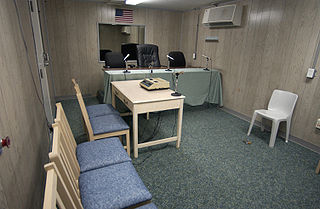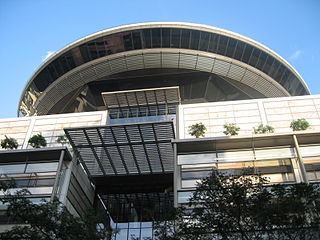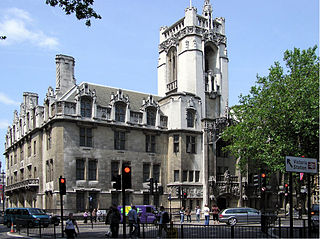| British Aerospace plc v Green | |
|---|---|
 | |
| Court | Court of Appeal of England and Wales |
| Citation(s) | [1995] ICR 1006 |
| Keywords | |
| Redundancy | |
British Aerospace plc v Green [1995] ICR 1006 is a UK labour law case, concerning redundancy.
| British Aerospace plc v Green | |
|---|---|
 | |
| Court | Court of Appeal of England and Wales |
| Citation(s) | [1995] ICR 1006 |
| Keywords | |
| Redundancy | |
British Aerospace plc v Green [1995] ICR 1006 is a UK labour law case, concerning redundancy.
British Aerospace decided that 530 jobs needed to be reduced from its 7000 strong plant. All 7000 were given individual assessments. Of the 530 dismissed, 235 of the low scorers contested the dismissals’ fairness. British Aerospace refused to disclose the forms of the ones not dismissed.

British Aerospace plc (BAe) was a British aircraft, munitions and defence-systems manufacturer. Its head office was at Warwick House in the Farnborough Aerospace Centre in Farnborough, Hampshire. Formed in 1977, in 1999 it purchased Marconi Electronic Systems, the defence electronics and naval shipbuilding subsidiary of the General Electric Company plc, to form BAE Systems.
The Tribunal held the forms had to be disclosed. British Aerospace appealed.
Waite LJ held the forms did not need to be disclosed unless it was to deal with a specific issue that had been raised, like an allegation that the wrong criteria were used on a particular employee. Any close scrutiny of how the transparent objective procedure is applied would be too much of an interference with the legitimacy of the employer's discretion. The Employment Appeal Tribunal was right to overturn the Tribunal because, first, the quick settlement of disputes spoke in favour of not requiring disclosure, given the absence of special circumstances for it. And second, the rule that documents only need to be disclosed when an issue is raised is in tune with county court rule O 14 R 8(1).

Sir John Douglas Waite is a retired Lord Justice of Appeal. Sir John was also the former Chair of the Independent Asylum Commission.
| “ | ...it becomes the task of the industrial tribunal to determine whether, in all the circumstances of each particular case, the employers have succeeded in providing a response to the tension between them which comes within the range of reasonableness… [...] ...in general the employer who sets up a system of selection which can reasonably be described as fair and applies it without any overt sign of conduct which mars its fairness will have done all that the law requires of him. [...] To have forced their disclosure for the purposes of an exercise in comparison designed to provide individual applicants with grounds for specific allegations of anomaly or mistake in particular instances would have done nothing to ease the task in hand—which was limited to the selection of sample cases—and would have run a serious risk of subjecting these multiple applications to procedural chaos. | ” |

The International Tribunal for the Prosecution of Persons Responsible for Serious Violations of International Humanitarian Law Committed in the Territory of the Former Yugoslavia since 1991, more commonly referred to as the International Criminal Tribunal for the former Yugoslavia (ICTY), was a body of the United Nations established to prosecute serious crimes committed during the Yugoslav Wars, and to try their perpetrators. The tribunal was an ad hoc court located in The Hague, Netherlands.

An unlawful combatant, illegal combatant or unprivileged combatant/belligerent is a person who directly engages in armed conflict in violation of the laws of war or is fighting outside of internationally recognized military forces. An unlawful combatant may be detained or prosecuted under the domestic law of the detaining state for such action, subject to international treaties on justice and human rights.

A tribunal, generally, is any person or institution with authority to judge, adjudicate on, or determine claims or disputes—whether or not it is called a tribunal in its title. For example, an advocate who appears before a court with a single judge could describe that judge as 'their tribunal'. Many governmental bodies that are titled 'tribunals' are so described to emphasize that they are not courts of normal jurisdiction. For example, the International Criminal Tribunal for Rwanda is a body specially constituted under international law; in Great Britain, employment tribunals are bodies set up to hear specific employment disputes. In many cases, the word tribunal implies a judicial body with a lesser degree of formality than a court, to which the normal rules of evidence and procedure may not apply, and whose presiding officers are frequently neither judges nor magistrates. Private judicial bodies are also often styled 'tribunals'. However, the word tribunal is not conclusive of a body's function–for example, in Great Britain, the Employment Appeal Tribunal is a superior court of record.

The Court of Arbitration for Sport is an international quasi-judicial body established to settle disputes related to sport through arbitration. Its headquarters are in Lausanne (Switzerland) and its courts are located in New York City, Sydney and Lausanne. Temporary courts are established in current Olympic host cities.

The Aircraft and Shipbuilding Industries Act 1977 is an Act of the Parliament of the United Kingdom that nationalised large parts of the UK aerospace and shipbuilding industries and established two corporations, British Aerospace and British Shipbuilders (s.1).

The courts of Scotland are responsible for administration of justice in Scotland, under statutory, common law and equitable provisions within Scots law. The courts are presided over by the judiciary of Scotland, who are the various judicial office holders responsible for issuing judgments, ensuring fair trials, and deciding on sentencing. The Court of Session is the supreme civil court of Scotland, subject to appeals to the Supreme Court of the United Kingdom, and the High Court of Justiciary is the supreme criminal court, which is only subject to the authority of the Supreme Court of the United Kingdom on devolution issues and human rights compatibility issues.

The Combatant Status Review Tribunals (CSRT) were a set of tribunals for confirming whether detainees held by the United States at the Guantanamo Bay detention camp had been correctly designated as "enemy combatants". The CSRTs were established July 7, 2004 by order of U.S. Deputy Secretary of Defense Paul Wolfowitz after U.S. Supreme Court rulings in Hamdi v. Rumsfeld and Rasul v. Bush and were coordinated through the Office for the Administrative Review of the Detention of Enemy Combatants.
Employment tribunals are tribunal public bodies in England and Wales and Scotland which have statutory jurisdiction to hear many kinds of disputes between employers and employees. The most common disputes are concerned with unfair dismissal, redundancy payments and employment discrimination. The tribunals are part of the UK tribunals system, administered by the Tribunals Service and regulated and supervised by the Administrative Justice and Tribunals Council.

Douglas/Kwantlen Faculty Assn v Douglas College, [1990] 3 S.C.R. 570 is a leading Supreme Court of Canada decision regarding the jurisdiction of an administrative tribunal.

Canada (AG) v Mossop, [1993] 1 SCR 554 was the first decision of the Supreme Court of Canada to consider equality rights for gays. The case is also significant as one of Justice L'Heureux-Dube's most famous dissents where she proposes an evolving model of the "family".
Habeas corpus is a recourse in law challenging the reasons or conditions of a person's confinement under color of law. A petition for habeas corpus is filed with a court that has jurisdiction over the custodian, and if granted, a writ is issued directing the custodian to bring the confined person before the court for examination into those reasons or conditions. The Suspension Clause of the United States Constitution specifically included the English common law procedure in Article One, Section 9, clause 2, which demands that "The privilege of the writ of habeas corpus shall not be suspended, unless when in cases of rebellion or invasion the public safety may require it."
Mike Campbell (Pvt) Ltd et al. v. Republic of Zimbabwe is a case decided by the Southern African Development Community (SADC) Tribunal. The Tribunal held that the Zimbabwean government violated the organisation's treaty by denying access to the courts and engaging in racial discrimination against white farmers whose lands had been confiscated under the land reform program in Zimbabwe.
O'Hanlon v Revenue and Customs Commissioners [2007] EWCA Civ 283 is a UK labour law case concerning disability discrimination.

McFarlane v Relate Avon Ltd [2010] EWCA Civ 880; [2010] IRLR 872; 29 BHRC 249 was an application in the Court of Appeal of England and Wales for permission to appeal against a decision of the Employment Appeal Tribunal, that a relationship counsellor dismissed for refusing to counsel same sex couples on sexual matters because of his Christian beliefs did not suffer discrimination under the Employment Equality Regulations 2003. The application was heard by Lord Justice Laws, who issued his decision on 29 April 2010 refusing the application.

Procedural impropriety in Singapore administrative law is one of the three broad categories of judicial review, the other two being illegality and irrationality. A public authority commits procedural impropriety if it fails to properly observe either statutory procedural requirements, or common law rules of natural justice and fairness.
The Essendon Football Club supplements saga was a sports controversy which occurred during the early- and mid-2010s. The Essendon Football Club, a professional Australian rules football club playing in the Australian Football League (AFL), was investigated starting in February 2013 by the Australian Sports Anti-Doping Authority (ASADA) and the World Anti-Doping Agency (WADA) over the legality of its supplements program during the 2012 AFL season and the preceding preseason. After four years of investigations and legal proceedings, thirty-four players at the club were found guilty of having used the banned peptide Thymosin beta-4 and incurred suspensions.

The "black spider" memos are letters and memos written by Charles, Prince of Wales, to British government ministers and politicians over the years. As the modern British monarch remains politically neutral by tradition, the letters are controversial because of Prince of Wales' position as the eldest child of the British monarch Queen Elizabeth II and heir apparent to the British throne.

R v Central Criminal Court [2014] UKSC 17 was a 2014 judgment of the Supreme Court of the United Kingdom. The court held that as inter partes proceedings created a lis between the parties, equal treatment meant that ex parte evidence in general could not be adduced.

Spring v Guardian Assurance plc [1994] UKHL 7, [1995] 2 AC 296 is a UK labour law and English tort law case, concerning the duty to provide accurate information when writing an employee reference.

R (Evans) v Attorney General is a 2015 decision of the Supreme Court of the United Kingdom. It concerned a request for disclosure of communications passing between Charles, Prince of Wales and various government departments.